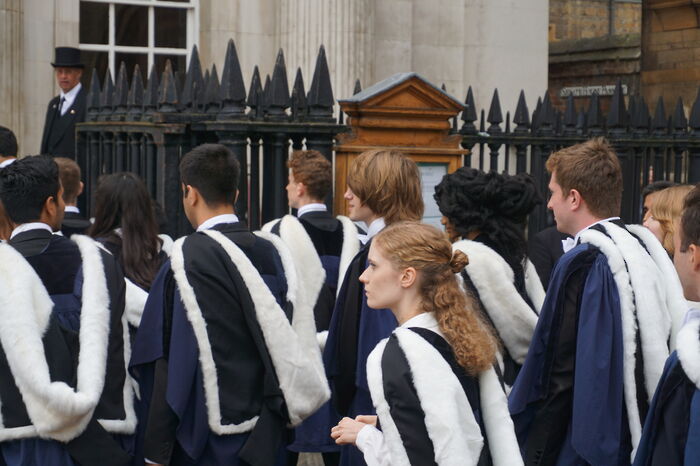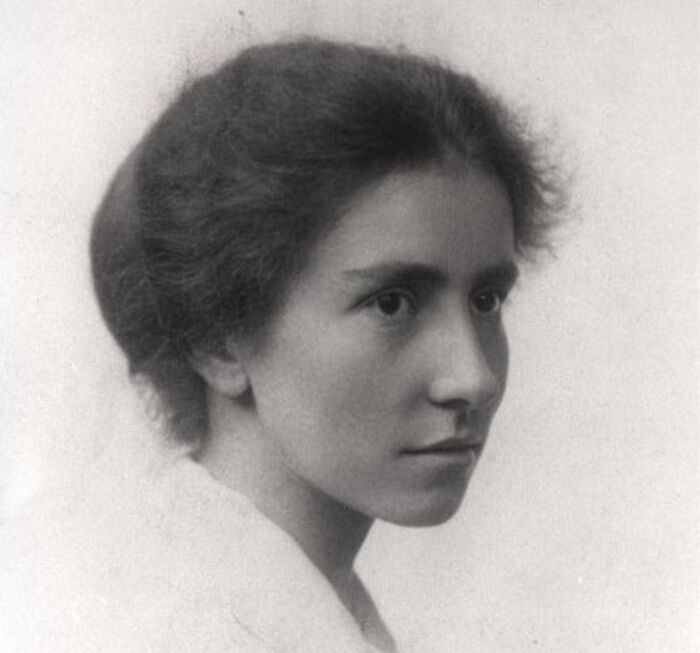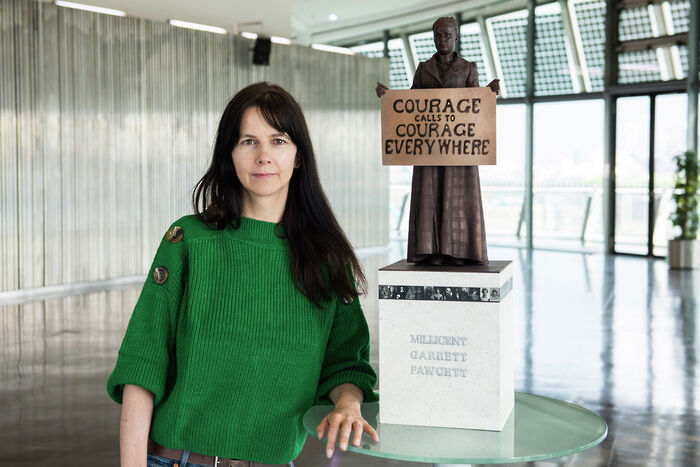Suffrage centenary: Cambridge celebrates 100 years of the vote
Exactly 100 years after women gained the vote, Cambridge unveiled a plaque to Newnham co-founder and trailblazer for women’s suffrage.

Over 400 people gathered to commemorate 100 years of women’s suffrage in the Guildhall on Tuesday evening. The event started with a re-enactment of a 20th century suffragist meeting, then cut to the present day, when the City Council unveiled a new plaque for uffrage trailblazer and co-founder of Newnham College, Millicent Garrett Fawcett.
The plaque reads “Courage calls to courage everywhere”, a famous, oft-repeated quote from Fawcett in her tribute to suffragette martyr Emily Davison in 1913 following her death in the Epsom Derby.
Dedicating the plaque to Millicent Garrett Fawcett has been a long time coming for some. Professor Mary Joannou, co-founder of the Cam Vote 100 campaign and Emeritus Professor at Anglia Ruskin University, has been researching women’s suffrage for 30 years. Speaking to Varsity, she said: “Millicent Garrett Fawcett is the BBC’s most influential woman of the 20th century. It is shameful that we have had no plaque to her before. There is a plaque to her husband, and it’s right and proper that the city of Cambridge has acknowledged her.”
Henry Fawcett, a Fellow of Trinity Hall whose blue plaque stands in a building on Trumpington Road, was a Liberal MP and Postmaster General under William Gladstone. He was commemorated for promoting women’s suffrage and introducing parcel post, postal orders, telegrams and Post Office Savings.
Cambridge’s blue plaque scheme was launched in 2001 to honour the most famous people and events associated with the city. The plaque unveiled on Tuesday was funded by Newnham College, which Fawcett founded in 1871 with just five students. It currently houses 655 students, and about 70 academic staff.
That evening, prior to the unveiling of the plaque, the Guildhall was transformed into a 20th century suffragist meeting.
At 7pm, an actress dressed in the period costume of a long white dress and black coat, with a felt hat, stepped onstage. She recited verbatim, to a hushed audience, the speech of suffragette trailblazer Emmeline Pankhurst, given over a hundred years ago. Her voice rang through the hall lit with dim, purple light – a suffragist colour – saying: “It is not sympathy we want. We want the vote.”
Performers from Cambridge Devised Theatre and Classworks, similarly costumed, were scattered amongst the audience. A group of actors – including one in a University gown – repeatedly heckled and insulted the suffragette leader, suggesting that she “mind her own business”, and calling for her re-imprisonment. When the actress began to say, “I’ve just come today from–”, they cut her off, jumped up from their seats and yelled: “Norwich prison!”
Several actresses, dressed similarly in early 20th-century attire, donned the purple, white and green sashes of the Women’s Social and Political Union (WSPU), which Pankhurst founded and led. At one point, they shouted, “Oh, just let her speak!” in response to the men’s heckling.
The final line of Emmeline Pankhurst’s speech, in which she encouraged sympathisers in Cambridge to “go into the fighting ranks” and strive for women’s suffrage, was met by a standing ovation.
Speaking to Varsity, one of the actresses, Ros Connelly, said: “The speeches tonight, which are verbatim from Mrs Brackenbury and Mrs Pankhurst’s speeches, seem incredibly topical about a certain kind of powerlessness, certain kinds of male behaviour that people have gotten away with with impunity, so it still keeps reminding us that there’s still loads of way to go.”
With the day’s celebrations of Fawcett, Newnham, too, was in the spotlight. Dr Gillian Sutherland – Fellow Emerita and former Director of Studies at Newnham – spoke at the ceremony about the life and work of Fawcett. She remarked that “today is Newnham’s day.”
Speaking to Varsity, Dr Sutherland emphasised her frustration at the misunderstandings that plague the public perception of the women’s suffrage movements, particularly the repeated conflation of suffragists and suffragettes.
Though they campaigned for the same cause, the suffragists’ and suffragettes’ methods differed greatly. While Millicent Fawcett and the suffragists of the NUWSS were committed to peaceful protects, the suffragettes of Emmeline Pankhurst’s Women’s Social and Political Union (WSPU) believed in direct action and militancy.
Dr Sutherland said: “Behaving like the Pankhursts is sexy, it makes television programmes, whereas the quiet hard-working, organising, collecting money, constructing an organisation, holding it together, running a weekly newspaper – the Common Cause – isn’t sexy. It’s just effective, particularly when this was translated so powerfully into wartime work.”
Commemorations began earlier that day. Just outside the Guildhall that afternoon, a woman, dressed in 20th century attire, stood atop a bright purple soapbox, telling passersby, “A hundred years since women got their vote! A hundred years since the working-class man got his vote!”
Speaking to Varsity, Gráinne Kennedy, who had spent 40 minutes atop the soapbox, said she was there for her great-grandmother: “Mary Redmond was my great-grandmother, and we know very little about her, but we know that she was someone who organised political campaigns.
“She was someone who wouldn’t have had land, and therefore when the vote came in, she didn’t get [it], even though she probably would’ve spent her life outside of her home campaigning for [it], but then we don’t know because women’s history wasn’t recorded.
“I’m standing here as the ordinary woman. Emmeline Pankhurst was fantastic, but we needed a lot of Mary Redmond’s to make that difference as well. [...] They were ordinary people but they risked a lot.
“That’s why I’m standing here today - I’d like to know more about their histories, but I don’t.”
When asked about responses from passersby, she said: “People are giving a little nod, and they’re going about their day and saying to themselves, ‘This is an important day, and people’s rights are always won. They’re never really given, unfortunately.’”
The historical significance of the date moved others to think about the future. Hilary Cox, a local activist, started the 24-hour #mycamvote photography project, which aimed to showcase women a hundred years after achieving the vote. Photographs posted on 6th February with the hashtag #mycamvote and taken at the photo booth set up in the Guildhall are in the process of collation and will feature in an upcoming exhibition.
The hashtag has accumulated 20 posts on Instagram, over 400 tweets, and 52 public pictures on Facebook.
Speaking to Varsity, Cox said: “I’m passionate about bringing people through our stories, through our history, through archiving present-day occurrences, and to looking to the future together.”
Reflecting on the past century, walking the same streets that Fawcett, Pankhurst and countless other brave women walked, some were moved by the sacrifices made in order to bring about a better, more just future. Others seemed inspired to continue the struggle for true gender equality.
Connelly remarked: “I think a place like Cambridge, educating women, will always be at the vanguard of rights for women, which we still need to keep doing. We still need to keep pressing for these things.”
It was only ten years after 1918 that the voting age of women shifted to 21, giving women the same voting rights as men. A statue of Fawcett, who attended the parliamentary session on 28th July 1928 and witnessed the bill becoming law, will be unveiled in London’s Parliament Square in April this year, where, standing beside the eleven existing statues of notable men, hers will be the first of a woman.
 News / Candidates clash over Chancellorship25 April 2025
News / Candidates clash over Chancellorship25 April 2025 Interviews / Dr Ally Louks on going viral for all the wrong reasons25 April 2025
Interviews / Dr Ally Louks on going viral for all the wrong reasons25 April 2025 Music / The pipes are calling: the life of a Cambridge Organ Scholar25 April 2025
Music / The pipes are calling: the life of a Cambridge Organ Scholar25 April 2025 News / Cambridge professor paid over $1 million for FBI intel since 199125 April 2025
News / Cambridge professor paid over $1 million for FBI intel since 199125 April 2025 Arts / Plays and playing truant: Stephen Fry’s Cambridge25 April 2025
Arts / Plays and playing truant: Stephen Fry’s Cambridge25 April 2025









